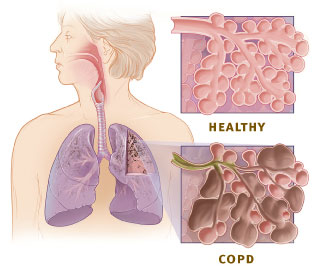Distant spread of cancer is a feature that depends on many co-ordinations at cellular and molecular level. Distant spread or metastasis of tumours occur mainly through three ways; contiguous spread; spread via lymphatic and via blood vessels.
 Image via Wikipedia; Metastasis
Image via Wikipedia; Metastasis
The cancerous cells have to dissociate from the parent tumour, cross the matrix or the frame work on which cells rest, get access to the blood vessels and lymphatic through the cellular barrier for metastasis to take place.
This is achieved through various gene expressions; up or down regulation of certain other enzymes and proteins.
Several facilitator and suppressor proteins have been found out by the researchers, which influence the tumor growth and metastasis.
The critical step of metastatic tumor cells to cross extracellular matrix (ECM) tissue boundaries is accomplished by expression of active enzymes, the metalloproteases (MMPs).
The metastatic tumor cells can down-regulates metastatic suppressors such as the Breast Cancer Metastasis Suppressor 1 (BRMS1), those suppress metastasis without blocking orthotopic tumor growth.
BRMS1 has been reported to block lung and regional lymph node metastasis in experimental breast models and decreased expression of this protein has been demonstrated to correlate with reduced disease-free survival in human breast cancer.
It had been seen that BRMS1 suppression of tumor metastasis is mediated via inhibition of NF-kB and subsequent suppression of the urokinase-type plasminogen activator (uPA), a serine protease that is known to activate the MMPs those help invasion and metastasis.
The aim is to block the key mechanism involved in encouraging metastasis facilitators and suppressing metastasis suppressors.
A new study on a synthetic compound (migrastatin) that specifically targets fascin and inhibits its metastasis-mediated activity has generated considerable interest in targeting this pathway of cancer spread.
Recently, researchers found out the way Fascin suppresses the molecules those hinder metastasis and on the other hand up-regulates certain other who help metastasis of cancer.
The researchers demonstrated that fascin expression in breast cancer cells can be targeted as a potential therapeutic intervention in metastatic breast cancer treatment.
The cancerous cells have to dissociate from the parent tumour, cross the matrix or the frame work on which cells rest, get access to the blood vessels and lymphatic through the cellular barrier for metastasis to take place.
This is achieved through various gene expressions; up or down regulation of certain other enzymes and proteins.
Several facilitator and suppressor proteins have been found out by the researchers, which influence the tumor growth and metastasis.
The critical step of metastatic tumor cells to cross extracellular matrix (ECM) tissue boundaries is accomplished by expression of active enzymes, the metalloproteases (MMPs).
The metastatic tumor cells can down-regulates metastatic suppressors such as the Breast Cancer Metastasis Suppressor 1 (BRMS1), those suppress metastasis without blocking orthotopic tumor growth.
BRMS1 has been reported to block lung and regional lymph node metastasis in experimental breast models and decreased expression of this protein has been demonstrated to correlate with reduced disease-free survival in human breast cancer.
It had been seen that BRMS1 suppression of tumor metastasis is mediated via inhibition of NF-kB and subsequent suppression of the urokinase-type plasminogen activator (uPA), a serine protease that is known to activate the MMPs those help invasion and metastasis.
The aim is to block the key mechanism involved in encouraging metastasis facilitators and suppressing metastasis suppressors.
A new study on a synthetic compound (migrastatin) that specifically targets fascin and inhibits its metastasis-mediated activity has generated considerable interest in targeting this pathway of cancer spread.
Recently, researchers found out the way Fascin suppresses the molecules those hinder metastasis and on the other hand up-regulates certain other who help metastasis of cancer.
The researchers demonstrated that fascin expression in breast cancer cells can be targeted as a potential therapeutic intervention in metastatic breast cancer treatment.
...
Click here to Subscribe news feed from "Clinicianonnet; so that you do not miss out anything that can be valuable to you !!
...






